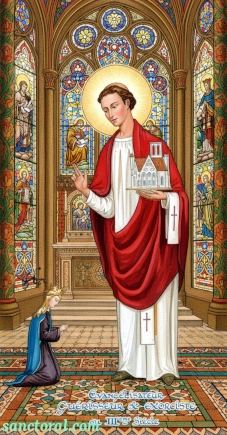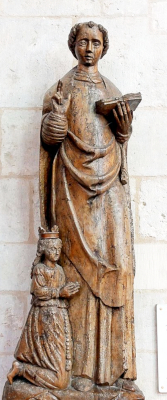Lives of the Saints
Our Models and Protectors
Spiritual Bouquet:
November 9

Saint Maturinus or
Mathurin de Larchant
Priest and Confessor
(† around 388)
Maturinus's father was named Marinus, and his mother Euphemia; they were noble people who lived in the Gâtinais, in the diocese of Sens, a land called Liricantus and now Larchant (Seine-et-Marne, arrondissement of Fontainebleau, canton of La Chapelle-la-Reine), part of the diocese of Meaux.
Marinus was such a zealous idolater that the emperors entrusted him with the task of pursuing and exterminating the Christians. He bore a son who would be the happiness of his family and the glory of his country. Marinus did not fail to inspire his son early on with the sacrilegious principles of his religion. But God preserved Maturinus from this impiety. The story goes that a holy bishop of Sens, named Polycarp, having found his heart ready to receive the seed of the Gospel, gave him the first understanding of it and instructed him so perfectly in all that he should know of the mysteries of our faith, that at the age of twelve he was ready to receive baptism.
The grace of baptism had such a great effect on Maturinus's soul that he seemed to be ablaze with the love of Jesus Christ. He spent the days and nights in fasting, vigil and prayer, continuously imploring divine mercy to obtain the conversion of his parents. His prayer was soon answered. Euphemia, amazed at her son's virtue, had no difficulty in accepting the doctrine of salvation which he proposed to her. Marinus had a mysterious dream in which he saw his son leading many people as a shepherd leads flocks. He recognized the abundance of heavenly favors with which Maturinus was blessed, and consented to share in the grace of baptism which he had received. Polycarp came to their house, and having completed their instruction, he conferred on both of them the sacrament of spiritual regeneration. Thus Maturinus was spiritually the father of those who had given him life, and Marinus, formerly a persecutor of Christians, became their refuge, support and protector.
Maturinus, continually growing in virtue, was judged worthy by his bishop to enter holy orders. At the age of twenty, he was ordained a priest and began to offer the Holy Sacrifice of the mass. He received the gift of miracles as well and such great power over demons that there was none possessed by the devil that he did not easily deliver. Moreover, God gave him a marvelous ability to explain the truths of our religion and to persuade his hearers of them. Polycarp ordered him to preach the Gospel and to announce to the people the great mystery of a crucified God. It is added that, on a journey which this prelate made to Italy and from which he did not return, he entrusted Maturinus with the care of the diocese, and that Maturinus carried out this task with admirable zeal and piety.
After several years he was called to Rome to deliver the daughter of a prince, who was being violently tormented by a demon. His stay there bore the fruits that had been expected. He delivered several other possessed persons, and during the three years he remained there, he brought a great number of servants to Jesus Christ by his preaching and miracles. Finally, the hour of his reward having come, he died in peace, with the sole regret of not having shed his blood for the faith in the midst of persecution. His death occurred in Rome on November 1st, but in Paris, his feast day is celebrated on the 9th.

Basilica of St. Maturinus in Larchant
In the images of Saint Maturinus, we often see chains or handcuffs hanging near him as an ex-voto, because he was invoked to deliver possessed people, against mental illness, etc. He is often depicted blessing a woman while the demon escapes through the patient's mouth or skull, alluding to his trip to Rome, mentioned above. In many popular images, pewter pots and dishes accompany St. Maturinus and St. Fiacre, who were the patrons of pottery makers in Paris. St. Maturinus is invoked for the healing of mental illness, epilepsy, demon possession, and people who are afflicted by fright and panic.
During his illness, Maturinus had expressed the wish that his body be transferred to Larchant in France. Several pious people, who had received special graces through his intercession, undertook to transport him there. It is said that this sacred deposit rested for some time in a house which was formerly outside the city of Paris, and that so many miracles were performed there that a chapel was built in his honor; it has since been given to the Trinitarians, formally known as the Order of the Most Holy Trinity and of the Capitves, hence the name of Mathurins has remained with them throughout France.
These holy relics were then taken to Sens and from there to Larchant where miracles continued. A magnificent church was built there, rivaling with the most beautiful buildings of its time. The Calvinists destroyed it in their rebellion against the Church and the State; all that remains of it are the debris, an object of universal admiration. The Revolution destroyed the veneration of Saint Maturinus as the Calvinists had destroyed his church. His relics were thrown to the wind.
From the eleventh to the fifteenth century, Larchant was an important stop on the pilgrimage route to St. Jacques de Compostelle. In the past, faithful from all the parishes ten leagues around, came in procession to the shrine of the Saint. Even today, Saint Maturinus is celebrated during the annual Pentecost pilgrimage.
Les Petits Bollandistes, Vies des Saints, Tome 13, Paris, Bloud et Barral, 1876